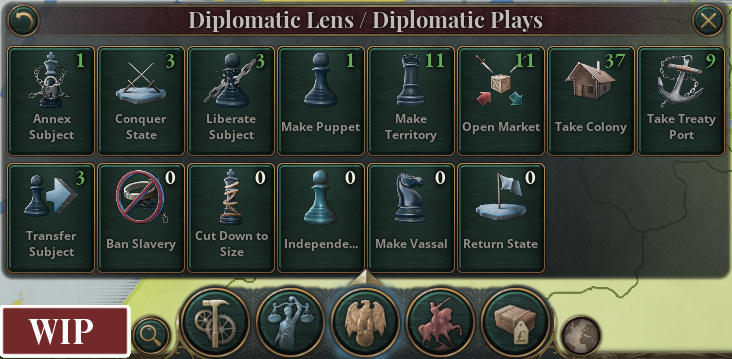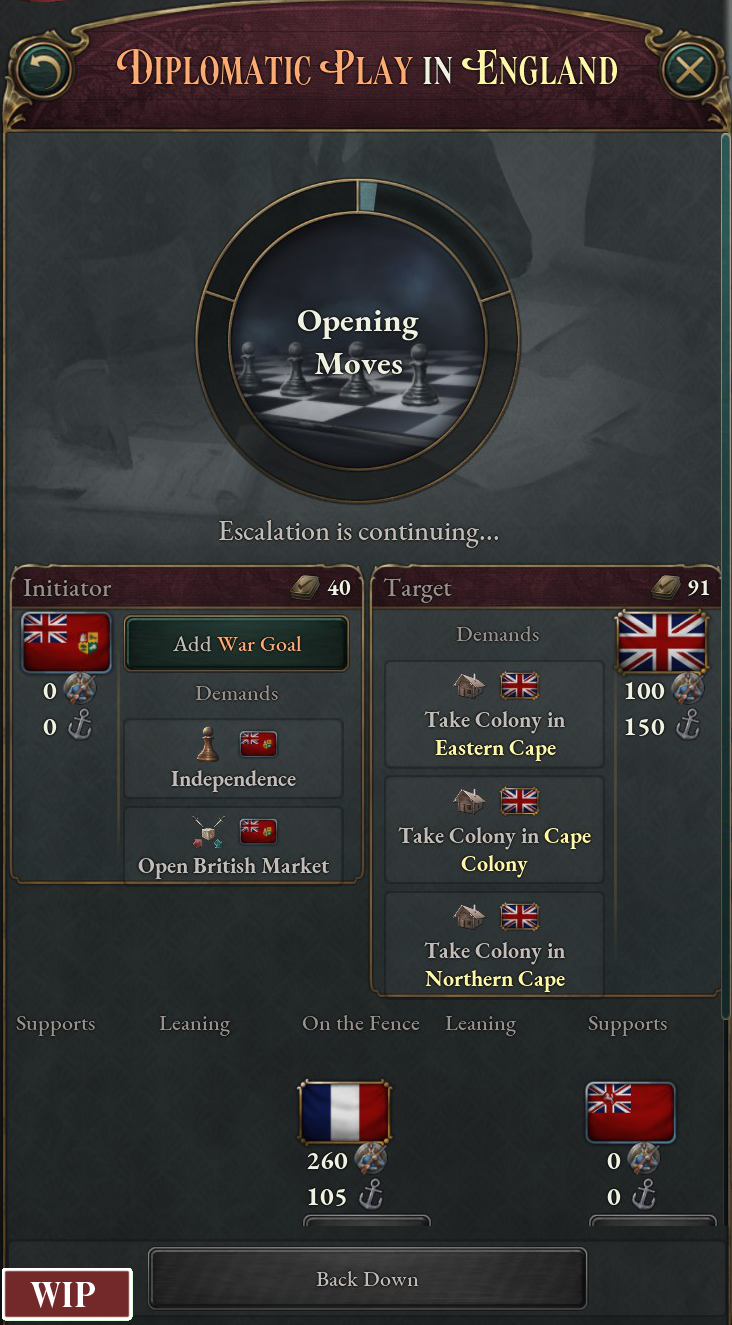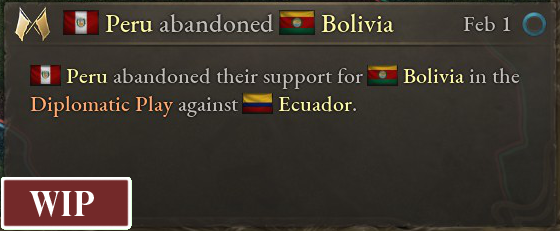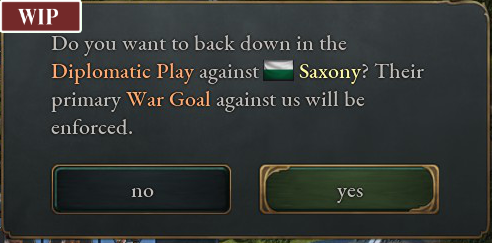
So what are Diplomatic Plays? Well, to answer that question, I’m going to reach all the way back to Dev Diary #0 and one of the four game design pillars, namely Diplomatic Eminence. That pillar reads as follows: War is a continuation of diplomacy, and everything that is achievable by war should also be achievable through diplomacy (even if that diplomacy sometimes comes at the point of a gun).
Well, diplomacy at the point of a gun is exactly what Diplomatic Plays are, as they allow you to try to achieve any objective normally achievable by war by diplomatically maneuvering to force the other side to give it to you without a fight. To fully explain what I mean by that, we’ll go over the mechanics of Diplomatic Plays in sequence - how they start, how they play out, and finally how they are resolved.
The way Diplomatic Plays start is the way you would normally start a war in another Paradox Grand Strategy Game - by demanding something from another country, for example that they cede a particular state to you. In fact, unlike other GSGs, Victoria 3 has no ‘declare war’ button to get what you demand - instead you start a Diplomatic Play, and wars are always preceded by Diplomatic Plays.
The fourteen opening moves currently available as Diplomatic Plays, each corresponding with a war goal. As usual, the number in green indicates the number of possible valid targets that exist for that Play.

Once a Diplomatic Play is started, there’s a number of things that happen immediately. First, the country that is being targeted is of course notified, along with any countries that are considered Potential Participants in the play. Who is considered a potential participant depends on the exact nature of the play, but usually it includes any country with an Interest in the Strategic Region where the Play is taking place as well as countries that have a strong diplomatic reason to get involved (such as allies or the overlord of the defender). At this point it’s important to note that only the Initiator (the country starting the play) and Target (the country targeted) are active participants, all others just have the potential to take part.
Next, the primary active participants on each side (the Initiator and the Target initially, though this can change if the overlord of either side steps into the play) are given a number of Maneuvers. This is a currency that primarily depends on Rank, with higher Rank countries having more maneuvers, and determines how many actions such as Swaying and adding Demands (more on these below) that said primary participant can take during the course of the play to try and gain the advantage over their enemy.
There are three distinct phases over which a Diplomatic Play plays, based on the level of Escalation, which is a value that increases each day after the play is started. The first of these is Opening Moves, during which participating countries take stock of the situation, set their initial stances (more on that below) and the Target has time to set their Main Demand (the Main Demand of the Initiator has already been set, as it depends on what type of Play was started). During the Opening Moves phase, it isn’t possible for other countries to fully commit to one side or another, with the sole exception of overlords of the primary participants. It also isn’t possible for either side to back down.
Cape Colony’s bid for independence and open British markets turned out to be a step too far. Britain demands nothing less than total annexation of the colonial upstarts, whose only hope now is either suffering partial annexation for its insolence, or having to get in real close with France and hope for the best.

Once Escalation reaches a certain point, the Opening Moves phase ends and the Diplomatic Maneuvering phase starts. If by this point the Target has not set their Main Demand, they are automatically given one (usually War Reparations). This is the ‘main’ phase of the Diplomatic Play, which occupies the majority of the escalation scale and during which most of the ‘action’ takes place. 
During this phase, potential participants can now set any stance towards each side, from full support without requiring anything in return (something most AIs won’t be keen to do as they’re not big on having their troops die for charity, at least not in an offensive war), to leaning towards a particular side (which will signal to that side that they’re likely willing to be swayed), to simply being on the fence with no particular preference for either side. It’s also possible for countries that have not committed to one side or the other to simply Declare Neutrality and exit the play altogether, though this might have diplomatic consequences depending on the circumstances.
With only a fraction of the military strength of Great Qing, Kokand’s future independence looks highly questionable. But this Play still has the potential to become pretty complex if Kokand can convince the Sikh and Russian empires to support their case against Qing. Perhaps gaining another subject is not worth the risk of a protracted war that might well cost upwards of half a million lives.

The Diplomatic Maneuvering phase is also when the primary participants are expected to use up their available Maneuvers on adding Demands and Swaying potential participants to their side. It is also possible to spend your Maneuvers during the Opening Moves phase on adding Demands for yourself, burning through most of them early might leave you at a significant disadvantage late. 
Demands are essentially Wargoals (and will turn into such if the Play escalates into war, but more on that later) and includes a wide variety of requests-under-duress such as ceding land, giving up claims or becoming a subject. Only the primary participants can add Demands, but in addition to demanding things on their own behalf they can also demand things on behalf of other countries backing them, if said country agrees that the Demand is something they want.
While this may make it sound like it’s a good idea to spend your maneuvers piling on as many Demands for yourself as possible, there’s a couple reasons not to. First, adding certain aggressive Demands (such as demanding land) always results in a Diplomatic Incident, which will immediately give you Infamy and may degrade relations with countries you need to support you in the Play. Second, being seen as greedy and unreasonable in your Demands will in itself make it harder to get countries to back you up, and may in fact make it so undecided participants side against you just to put a stop to your mad dreams of conquest. It’s worth noting though, that the Infamy from any Demands or Wargoals that end up not being pressed (for any reason) is partially or fully refunded, though their negative impact on relations remain.
Swaying, on the other hand, is the main way in which the primary participants get undecided participants over to their side, by making them a promise. This promise may be in the form of owing them an Obligation (more on this in a later dev diary) or promising them a Wargoal if the Play escalates into war. There’s a few more such types of promises planned for release (promising to become their Protectorate or giving them a piece of land or a subject of yours, for example) but these are not yet implemented. If the country agrees, they will be set as backing the Swaying side in the Diplomatic Play, and will fight on their side if war breaks out, just as if they voluntarily set their stance to backing that side.
Offering Prussia the Austrian states of West Galicia, Moravia, or Bohemia would be most appreciated, as they are populous border states. States which do not already border Prussian land are less attractive to them as they would be much harder to manage.

However, if you think the Play is over just because France threw their weight behind the Initiator and there isn’t anyone strong enough to oppose them, you’d be wrong! It’s possible for countries that have promised to back a side to betray that promise and go back to being undecided, or even switch sides entirely, perhaps because the other side made an even juicier offer. Doing this of course makes them lose out on anything that was promised to them and negatively impacts on relations with the betrayed side, but otherwise there is no limit to how many times a single country can switch sides in a Diplomatic Play (the AI will be rather reluctant to offer something to a country that has already forsaken them once unless they desperately need their support, though). 
This also means that trying to ‘play it smart’ by burning through your maneuvers immediately to sway all the countries you think you need early in the Play can backfire, as the other side is then free to try and ‘bid over’ on your supporters while you’re unable to do anything. Furthermore, it can also make it risky to not be upfront about your own territorial demands - doing the swaying first and then saying ‘oh, and by the way, I want London’ might result in your side of the Play looking very empty all of a sudden as your former supporters scramble to distance themselves from you. Swaying and adding Demands during Diplomatic Maneuvering will also both pause Escalation for some time when carried out, to make it possible for the other side to react even if those actions are taken right at the end of the phase.
[Bolivia will remember this]

The final phase of the Diplomatic Play is Countdown to War, which is exactly what it says on the tin. During Countdown to War, both sides are locked down and it’s no longer possible for countries to declare or abandon support for either side, nor is it possible to add new Demands or do any Swaying. In fact, the only thing that is possible during this phase is Backing Down, and this is usually the phase when you will see one of the sides give in (though it is also possible to back down during Diplomatic Maneuvering).
Backing Down is, quite simply, one side deciding that the odds aren’t looking in their favor and deciding to concede the Main Demand of the other side to cut their losses. It’s important to note that only the Main Demand is ever conceded in this way, so any additional Demands that are either added or promised to supporters of the winning side are simply lost (with accrued Infamy fully refunded), along with of course all the Demands on the losing side. This means that there is actually in some cases a reason to want the Play to escalate into war (and hence, to not stack the odds in such a way that the other side sees no path to victory), as it is the only way in which you can simultaneously press multiple Demands/Wargoals, assuming you’re willing (or at least think you’re willing) to bear the heavy cost of the war. It’s possible to back down all the way up until the Escalation meter hits 100, at which point the Diplomatic Play is over and War breaks out.
Once all the cards are on the table you have to carefully weigh if this is really something you’re able to win, and what cost you’re willing to pay for the opportunity to try. Perhaps it’s better to cut your losses, gain a Truce, let the other side accrue some Infamy, score a Claim on the lost territory (if the Play was about land), and start making a plan to recover what you lost - and then some.

Whew, that was a lot of text, and I’m sure I’ve still missed some detail or another. As those of you who are familiar with Victoria 2 has noticed, Diplomatic Plays draws a lot of inspiration from the Crisis feature in Victoria 2: Heart of Darkness, a feature I’ve personally worked on and always thought was one of the most interesting things we’ve done in any expansion for a Paradox GSG. But with that said, our dev diaries on Diplomacy are drawing to a close (for now, we’ll certainly return to the subject later) as next week we’re going to talk about something you’ve been (rightfully) curious about since the announcement… War!



